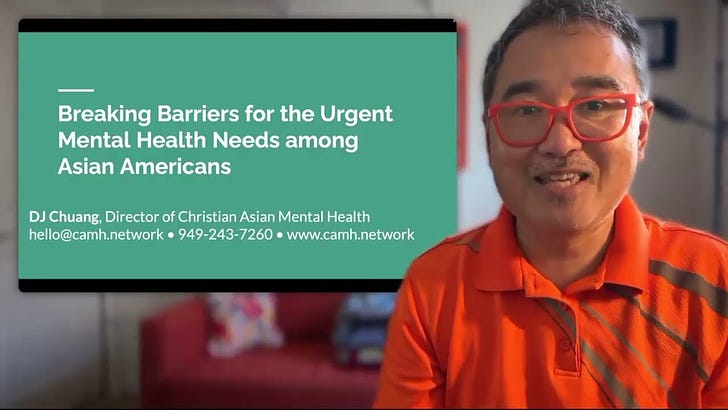staying the course and doing what I can
in light of mental health work being so much bigger than any one initiative
Whew. It’s taking me a bit longer to recover from 5 weekends of travels, after great invigorating events and engaging conversations in Cleveland, Atlanta, Washington DC, New York City, Silicon Valley, Los Angeles, and online.
These three thoughts I blogged after the Mental Health & the Church conference:
this kind of a gathering needs to happen every year, annually, if this topic is going to move forward. Having an occasional conference now and then, or here and there, does not build the relationships and continuity this thing urgently needs attending to, some would even say, mental health crisis or epidemic.
There’s quite the gap between mental health professionals and academics, who have significant industries and institutions, and the 300,000+ churches and pastors in the USA.
There seems to be a church pastor’s reluctance or resistance to bless and empower the church’s members to start a mental health ministry, even though pastors already know people struggle with mental health challenges, as this journal article rightly stated: “The First Person They Call is Their Pastor.”
Plus, I started reading the book titled, Lay Counseling, Revised and Updated: Equipping Christians for a Helping Ministry, by Siang-Yang Tan and Eric T. Scalise. The book covered many historical moments back to 1970 regarding the development of Christian counseling and unpacks the biblical and practical necessity for lay counseling and care ministry.
Honestly, I did not know that this much effort has been put forth by so many for decades to equip churches for lay counseling. It makes me wonder how much more work will it take and when will care ministry & lay counseling reach an inflection point to be a normal part of our church’s ministry?
A Personal Touch to Caring for People
One new initiative called The Church Cares is empowering churches to train members with gifts in caring for others to address their communities' emotional, relational, and behavioral distress issues. Their innovation uses a 3-hour training to empower everyone to care because everyone hurts.
I’m grateful to be in conversation and in relationship with its co-founders, Dr. James Sells and Dr. Jennifer Ripley, as we explore strategic steps to make their free training resources more known and accessible to more churches near and far.
While my primary course for Christian Asian Mental Health is to activate mental health ministry for every Asian American church, along the way I’m recently getting more calls and contacts from individuals asking for help with finding resources. I count it an honor and privilege that people would trust me enough to call me in their moment of need. I do my best to be helpful as a concierge, an encourager, and a resource navigator.
take your pick: a Presentation or a Webinar
let’s partner together
There are three ways you can partner with CAMH on this mission to bring mental health ministry to every Asian American church:
Introducing - share with churches & pastors about the resources and coaching that CAMH is providing to Asian American churches, by forwarding this email and sharing the CAMH website link camh.network
Investing - make a donation to support our efforts at camh.network/donation
Involving - become a volunteer with your church or with CAMH; let’s talk
With a heart full of thanksgiving, I am grateful for YOU!
— DJ Chuang, Director of Christian Asian Mental Health, a program of Catalyst Wellness Alliance • 949-243-7260



